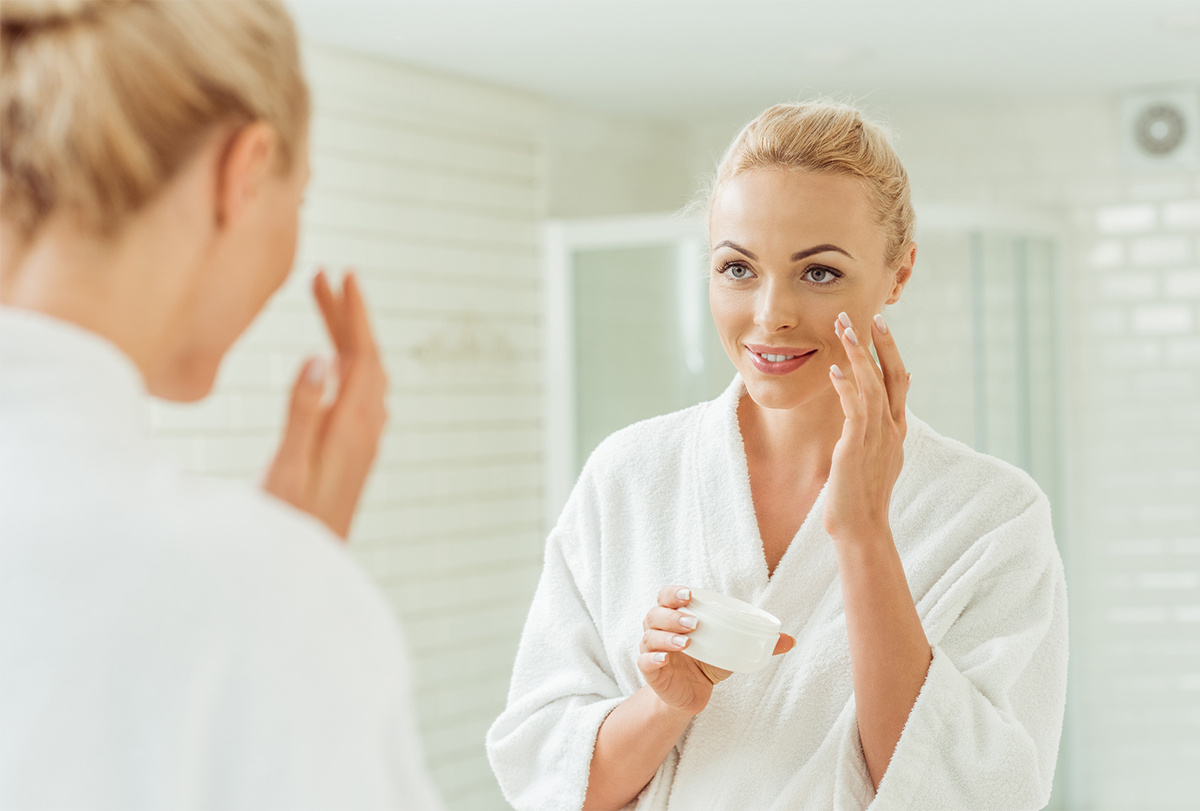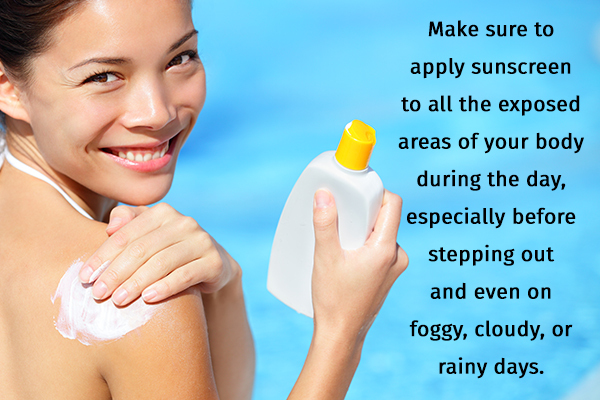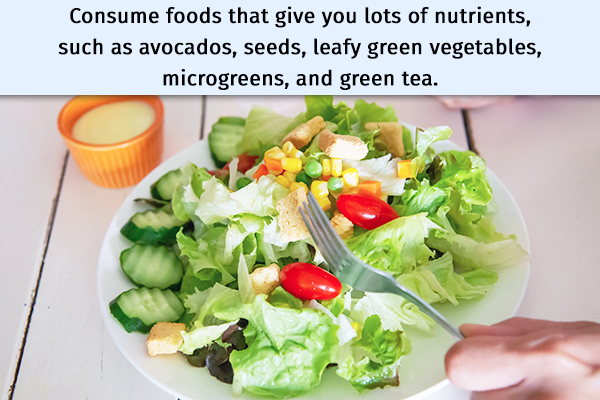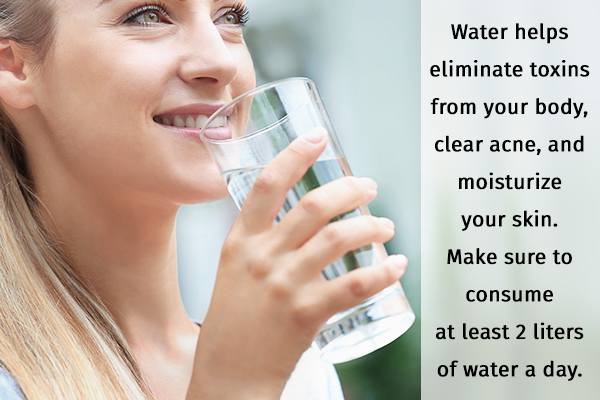In this article:
Aging is a natural part of life. As you grow older, your body is bound to undergo several changes. Although everyone has to go through these changes, they may manifest differently in different people.

Some common factors that can affect the aging process include:
- Diet
- Genetics
- Physical activity
- Weight
How to Delay the Effects of Aging
Here are a few simple practices you can incorporate into your life to slow down the effects of aging on your body and lead a healthy lifestyle.
1. Establish a good skin care routine
Aging causes a decrease in the skin’s collagen levels, which may lead to wrinkles and dullness. Taking proper care of your skin is essential to prevent skin maturation. (1)
Follow these simple tips to enhance your skin care routine:
- Choose a pH-balanced cleanser: Clean your face at least twice a day with a good-quality cleanser. The healthy pH of skin is around 5.5; pH-balanced products help maintain this level and preserve your skin’s natural oils.
- Exfoliate your skin: Exfoliating helps rejuvenate and refresh your skin. It removes dead cells and debris from the facial surface and promotes the growth of new cells. (2) Choose exfoliants meant for sensitive or aging skin to avoid skin damage.
- Moisturize: Moisturizers help keep the skin soft and supple. They provide much-needed hydration to the dermal cells, (3) leading to an increase in collagen levels. Use a moisturizer every day to prevent wrinkles and achieve fresher, youthful skin.
Additional skin care products:
- Hyaluronic acid: Hyaluronic acid is a hydrating agent used in various skin care formulations to reduce wrinkles (4) and acne scars.
- Retinoid serums: Retinoids are vitamin A derivatives. They can penetrate deep into the skin and boost collagen production. (5) Increased collagen levels help tighten your skin fibers to reduce the appearance of wrinkles and fine lines while also promoting skin regeneration to get rid of open pores, acne, and other skin blemishes.
2. Get some beauty sleep
Sleep is the body’s way of recharging itself. It helps relieve stress, improve brain function, and boost energy levels. (6) Your body releases hormones while sleeping that help repair skin cells and increase collagen production.
Inadequate sleep can make you prone to metabolic disorders such as diabetes or heart disorders, which can reflect poorly on your skin. (7)
3. Keep stress under control

Stress is an unavoidable part of life, but it is important to learn how to manage it.
Extreme stress can be detrimental to both your mental and physical health. It may induce collagen breakdown in the skin, turn hair grey, and cause inflammation.
Meditation and taking deep breathing exercises can help relax your body and relieve stress. Meditation may help decrease cortisol (the stress hormone), increase oxygen flow, and reduce anxiety. (8)
4. Exercise
Regular exercise is a great way to remain healthy throughout your life. It improves blood circulation, reduces cholesterol levels, and may prevent chronic illnesses that come with age. (9)
Go for morning walks. Walking is a great way to burn calories and stay active. It is a low-intensity exercise that people of any age can do.
Going for long walks regularly can improve blood flow, stimulate brain cells, and prevent age-related lethargy. Moreover, walking for at least half an hour a day can boost the functioning of your immune system. (10)
5. Protect yourself against sunlight

Prolonged sun exposure can be very harmful to your skin. Sunlight contains UV rays that penetrate deep into the skin to cause cellular damage, which can lead to premature wrinkles, hyperpigmentation, sagging, and sometimes even melanoma or skin cancer. (11)
Make sure to apply sunscreen to all the exposed areas of your body during the day, especially before stepping out and even on foggy, cloudy, or rainy days.
Choose a sunscreen that has an SPF level of 50 for maximum protection.
6. Avoid drinking and smoking
Alcohol is a well-known dehydrating agent, especially when consumed in excess. It makes your skin dry and rough and age prematurely.
Alcohol also depletes the antioxidant levels in the body. (12) Your body needs antioxidants to counter the harmful activity of free radicals that unleash oxidative damage on healthy skin cells.
Tobacco is another major factor for skin aging. (13) The nicotine in tobacco releases harmful toxins in the body and curbs blood flow, which has a detrimental effect on your skin health and overall health.
7. Consume nutritious foods

Consume foods that give you lots of nutrients, such as the following:
a. Avocados
Avocados contain several nutrients that nourish the skin. It is loaded with healthy fats that moisturize and add volume to the skin.
The antioxidants found in avocados help fight free radicals, which are unstable reactive molecules that are released in the body through dietary and environmental toxins. They attack healthy skin cells and break down collagen, making your skin age before its time.
Antioxidants not only curb free radical activity but also help repair the cellular damage done by them to reduce the appearance of wrinkles and fine lines.
Vitamin E is one such powerful antioxidant (14) that helps keep your skin cells healthy, and avocado contains plenty of it. This vital nutrient also promotes the production of collagen and elastin, which are structural proteins that build the skin fibers.
The flesh of avocado has a smooth, creamy texture and a mild earthy flavor. You can directly spread it on bread, toss it in a salad, enjoy it grilled, or combine it with a little salt, lemon, and onions to make dips like guacamole.
b. Seeds
Seeds possess a great deal of nutritional value, making them a healthy addition to any diet. Here are some of the best edible seeds for skin health:
- Sunflower seeds are replete with vitamin E, which stimulates the production of collagen and elastin (15) and also neutralizes free radical activity. Both of these properties go a long way in keeping your skin taut, smooth, and supple for a youthful appearance.
- Pumpkin seeds are loaded with antioxidants that are credited with numerous skin benefits, including antiaging properties. They help reduce and repair free radical-induced skin damage to prevent the premature formation of wrinkles and fine lines. (16) Some antioxidants facilitate collagen synthesis, which helps improve your skin tone and elasticity.
- Flaxseeds are high in lignans and antioxidants, which help protect and repair your skin cells to prevent premature signs of aging. Flaxseeds also contain fatty acids (17) that lubricate and plump up the skin to keep it smooth and supple.
c. Leafy green vegetables
Leafy green vegetables could be the key to glowing and youthful skin. They are rich in vitamins K, A, and E – all three play an essential role in preventing wrinkles (18) and preserving skin elasticity. Vitamin K also helps in the treatment of hyperpigmentation, scars, and dark circles. (19)
d. Microgreens
Microgreens, such as fenugreek, basil, and mint, are packed with antioxidants, vitamins, and proteins. (20) Seasoning your food with these nourishing ingredients not only adds flavor to your dinner but also provides a variety of health benefits.
Regular use of microgreens can protect you from heart disease, diabetes, and hypertension.
e. Green tea
Green tea, when consumed regularly, helps rejuvenate your skin and build immunity. Green tea is filled with antioxidants and flavonoids.
Antioxidants help fight free radicals that break down the collagen in your skin and thus trigger premature aging. (21) Flavonoids are anti-inflammatory compounds that support the immune system.
8. Hydrate your skin

Proper hydration is essential to achieve healthy, glowing skin. It helps reduce wrinkles, prevent acne, and brighten your complexion.
Water helps eliminate toxins from your body, clear acne, and moisturize your skin. Make sure to consume at least 2 liters of water a day.
Moreover, use facial products that are hydrating and help rebuild your natural skin barrier. These products include:
- Face packs: Hydrating face packs can be very beneficial for the skin. They nourish the skin and increase water content.
- Sheet masks: Sheet masks are infused with serums that can be absorbed by the skin. They have a soothing effect and can help heal a number of skin problems.
- Serums: Serums are generally concentrated solutions of various active substances. They are lightweight and hence can penetrate deeply into the skin for added benefits.
Note: There are several hydrating facial products, such as face packs and serums, sold in drugstores and beauty stores. Regular use of these may provide extra moisture to your skin.
9. Go for regular antiaging treatments
Several clinical procedures are available nowadays that help reverse the signs of aging on your skin. Some of these interventions are:
- Platelet-rich plasma (PRP) therapy: Platelets and growth factors are extracted from the patient’s blood and are injected into the facial skin. This procedure renews the skin cells and increases collagen production. (22)
- Radiofrequency skin tightening: This noninvasive technique is used to treat wrinkles, fine lines, and sagging skin. It utilizes low-energy radiation to tighten the skin. (23)
- Lasers: Laser rays are used to heat the deeper layers of skin to stimulate the production of collagen and elastin, leading to tighter skin. Ablative laser resurfacing is also employed to carefully remove the outer layers of skin to stimulate the production of fresh skin cells. (24) Laser treatments are used to treat a number of skin problems such as wrinkles, acne scars, and dark spots.
Self-Care Measures for Optimal Skin Health
Adding the following preventive measures to your routine can help you maintain a robust body throughout your life:
- Schedule an annual checkup with your doctor to keep track of your overall health. This will help you detect illness at the earliest stage.
- Avoid consuming fast food, which usually contains excessive amounts of sugars, sodium, and fat, which are highly detrimental to your health in the long run.
Final Word
Aging is inevitable and nothing to be ashamed of. Taking proper care of your body in your youth can preserve your health and help you age gracefully.
- Was this article helpful?
- YES, THANKS!NOT REALLY


